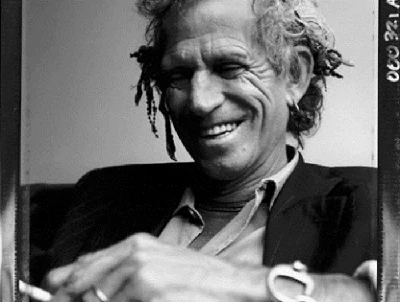Miscellaneous
-
K -The Kult of Keef
published: 30 /
6 /
2013

Andy Cassidy, after watching the Rolling Stones at Glastonbury, examines the cult of legendary guitarist Keith Richards
Article
I often find myself thinking about Keith Richards. Musically, he has been there almost my entire life. For all the riffs, though, I suspect that “Keef” is at least as well known for his hard-living, his drug use and the various scrapes, often comical, in which he has found himself over the course of his half-century spanning career.
I watched the Stones at Glastonbury a couple of weeks ago, and I was very impressed. Certainly, one should expect a good show from a band who have been playing together for fifty years, but there was more than experience on display. Taking to the Pyramid Stage for the first time in their career, the Stones exuded an enthusiasm which was entirely lacking from many of their more contemporary peers (Mumford and Sons, I’m looking at you). Dipping liberally into a back catalogue that most bands would kill for, they held the audience of 100,000 rapt throughout a spellbinding set consisting of classic after classic. Half of me, I confess, had wanted the Stones to slip up at Glasto – one could, quite justifiably, say that they have become a corporate cliché, but on the evening great music and a stellar performance won out.
Personally, I have never really liked Mick Jagger as a frontman. He’s too over the top for me and his arrogance (or what I perceive as his arrogance), although justified, really irks me. There’s no question that Mick has earned the right to swagger, but does he need to be so bloody irritating with it?
Consequently, whenever I watch the Stones live, I always keep an eye on Keith. In my opinion, he is the linchpin of the group, his crunching guitar holding the whole sound together. He strikes me as very much the leader of the band – it seems to me that everyone is following him, musically at least, and it is his insanely catchy riffs that act as the musical gel, tying percussion and vocals together.
Looking at Keith now, I wonder: does he really look his age? Many 70 year-olds I have encountered have nowhere near his level of fitness, and his appearance, though grizzled, is relatively good for his age.
And this is the thing about Keith, this contradiction. Can the same man really nurse his dying mother, sitting daily at her bedside, reading to her, and later snort his father’s ashes mixed with cocaine? Can the man who, whilst high on something or other, fell out of a palm tree whilst trying to pinch a coconut really have a fondness for antique books which he collects and organises according to the Dewey decimal method? This plurality leads me to question which is the “real” Keith.
I remember watching a documentary about the Beatles when I was a teenager, and pondering the difference between the Beatles’ and the Stones’ personas. On the one hand, there were four working-class boys from Liverpool who were, in the early days, seldom seen without matching suits and ties, who played for royalty, and who generally fostered a “clean” image*. On the other, there were The Stones – a group of middle-class boys from the stockbroker belt who became the original bad boys of British rock with Satanic references, overt drug use, Brian’s death, the Mandy Scott affair and so on.
My question is this: how much of the “Keef” legend is precisely that: legendary? Certainly, his regular appearance in the press has had a positive effect on record sales, but are the stories true? Could Keith survive what many of his contemporaries could not? If one believes the stories, Keef was at least as heavy a drug user as, say, Syd Barrett, Brian Wilson or Paul Kossoff and yet he came through the experience seemingly unharmed where they were suffered terribly. Could Keef have outperformed Hendrix, Morrison, Joplin and, closer to home, Brian Jones in terms of drugs and booze?
Don’t get me wrong, I’m sure Keef has had his dalliances with a veritable smorgasbord of mind-altering substances, both legal and otherwise, but were his excesses really as wild as they are made out to be by the Stones’ publicity machine? Or, as I suspect, has a kernel of truth been inflated to create the ultimate anti-hero, the ultimate bad boy?
Then I wonder does it really matter. Listen to the riff of ‘Start Me Up’, the incredible ‘Jumping Jack Flash’ or, indeed, the wonderfully delicate ‘Wild Horses’, and it’s clear that, whatever goes on in his private life, Keith is a magnificent songwriter and guitarist. A brief visit to his website, where he answers a seemingly endless stream of web correspondence from a myriad of fans, and his generosity of spirit is immediately evident. Recently the Stones’ rider was leaked, and, while Jagger opted for a draped off running area, Keef’s biggest conceit was a shepherd’s pie (he did insist that the potato topping remain undisturbed). Rock and roll.
Whatever the truth about Keith, I think it’s safe to say that we won’t have the Stones for very much longer. With that in mind, I believe that, for all their faults, they ought to be treasured and enjoyed while we still have the chance. Quite simply, they are a great band and the longer they are able to play like they did at Glastonbury the better.
Keith, whoever you are, I tip my hat to you.
*Of course, the Beatles, like the Stones would go on to have their share of problems with drugs and controversy – in the early days, though, they were simply a group of charming, well-mannered young men.